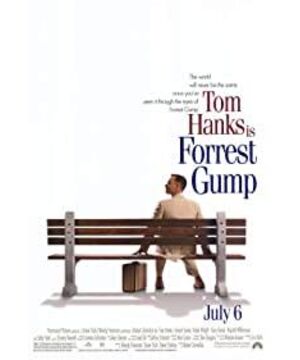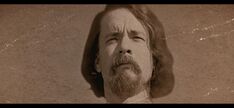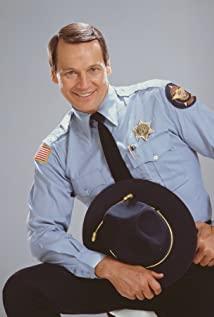The most attractive part of this film is the philosophy hidden under the protagonist's behavior, let's call it "Gumpism (Forrest Gump Philosophy)" for the time being. If you think about the essence of Forrest Gump's philosophy, you will be surprised to find that Forrest Gump's philosophy and two famous ideas in ancient Chinese history have the same purpose. One is the idea of "wuwei" advocated by Taoist Laozi. No matter how the world around him changes, Forrest Gump always goes his own way. He was never the initiator of events, but responded to those events like a feather in the wind, always keeping his thoughts pure and carefree. And those who try to change and fight the course of history are ultimately punished accordingly. Forrest Gump's attitude towards life is a passive, voluntary and drifting attitude.
The idea of inaction is celebrated in the film because rationality—the set of principles that must be done for a reason—has proven to be fallible. Take Bubba as an example. When he was about to die, Bubba asked Forrest Gump "why". Forrest Gump simply replied "You are going to die". The English original text is even simpler, "u died". This answer refuses to provide any explanation for Bubba's death. In fact, Forrest Gump can give Bubba a deep explanation of the causes of the Vietnam War from the political, economic, social and other aspects. The reason why he does not do this is: With Bubba only a few seconds to live, all explanations are superfluous and meaningless. Or it can also be understood that the Vietnam War itself was a wrong war, and no one can give a proper reason for why it happened. Another example in the film is the assassination of former US President John F. Kennedy. The film also does not give any explanation. From a historical point of view, this arrangement is very reasonable, because for decades Americans have not been able to get it right. The truth about Kennedy's assassination, so it would be foolish to give any explanation in the film. Forrest Gump chose the latter as his philosophy of life between rational and rational.
Another "oriental" thought in Forrest Gump's philosophy is "If you lose your horse, how can you know it is not a blessing?" There is no absolute boundary between the good and the bad. Under certain circumstances, the two can be transformed into each other. . There can be good and bad transformation between human characteristics. Forrest Gump was born with a low IQ, but this turned into an advantage when he entered the army. Jenny was born beautiful, but later became a singing lady in a strip club. Similarly, good and bad events can be transformed. Forrest Gump was bullied, but because of this he discovered his potential to be able to run. After entering college, he joined the school football team. Unfortunately, he joined the army and went to Vietnam to fight after graduation. , where he met Bubba, the best friend of his life, and determined the direction of his future career - to buy a shrimp boat to catch shrimp in his hometown, and then encountered a storm, and then their boat was the only one left. , eventually got rich. . .
Another important feature of Forrest Gump's philosophy is its unrepresentation. When Forrest Gump was about to give an anti-war speech in front of the Washington Memorial Hall, the power of the microphone was accidentally cut off by the surrounding crowd. When the microphone returned to the sound state, Forrest Gump had just finished speaking. Neither the audience present nor the audience in front of the screen knew what Forrest Gump said. Forrest Gump's feat of running all over the country has attracted many loyal followers. When asked what religious beliefs made Forrest Gump persist, Forrest Gump said nothing. Forrest Gump truth is defined by its unrepresentability.
Forrest Gump and the American
film critics have always had a keen interest in the analysis of the possibility of Forrest Gump as a film character representing the nation as a whole. This debate has produced three different accounts: one is that Forrest Gump is the embodiment of the simple, pure Huckleberry Finn idealism of the American tradition; the other is that he represents the historical trajectory of the past 200 years. The United States; third, he reflects the United States' ignorance or even ignorance of the suffering around it.
The first commented that Forrest Gump was the personification of a kind of American idealism: a pure virtue, a noble and honest simplicity, free from the prejudices and complexities of the old world. Forrest Gump's simplicity allows him to traverse the barriers of race and class, undisturbed by their presence. If there are two Americas, one is aggression outside and separates inside, and there is a "possible" America with humanity, intelligence, and unity, then Forrest Gump undoubtedly represents the latter. As such, Forrest Gump offers American audiences the possibility of a tolerant and humane self-definition of their country.
Some commentators believe that Forrest Gump is the modern United States, as a representative of the country in the historical process. America -- like Forrest Gump in the film -- is like a dumb giant clumsily moving through history, but trying to benefit the people or things around him. The idea that the United States is chosen by God to benefit all mankind can also find its shadow in the film, that is, Forrest Gump, who is destined to bring hope to those around him.
However, the critics also have a less positive version. Say that Forrest Gump is a fool who is incapable of understanding the world around him. He does not understand the misfortune of the outside world other than his own good fortune, nor does he know that his success is based on the misfortune of others. From this perspective, Forrest Gump reflects a moral failure of the United States. Like Forrest Gump, many Americans have had the experience of not understanding that their luck is based on the pain of others. As an individual, Forrest Gump's moral standards are indisputable, but he also volunteered to join the army to fight in Vietnam, but he never considered how serious the consequences would be for the local Vietnamese people; in order to make money, he also obtained business The upper hand due to the storm capsized his competitor's boat. Forrest Gump is a two-faced character, as is the America he represents.
Forrest Gump and historical
ideology can be defined as "an expression of the ideal relationship of the individual to his actual living situation", and in this sense Forrest Gump is an ideological film. He's a Hollywood production in the traditional sense, taking a thoroughly optimistic view of history, whitewashing the racial issues of the historical South and the social problems of the '60s. This makes the film part of America's restoration of memory, and the term restoration of memory is used to denote that the media allows the public to "live" historical events they never experienced before, as if they were part of their memory.
The screenwriter has moved his hands and feet on the adaptation of the script. The first sentence of the original script was "Being an idiot is not like the taste of chocolate in a chocolate box", while in the movie Forrest Gump said "Life is like a chocolate, you never know what happens next." One step you will taste". The scene in the book describing Forrest Gump's sexual behavior was also omitted by the screenwriter. The reason is that these descriptions of the original novel are "unacceptable".
However, it was the representation of American historical ideology—especially the negative portrayal of 1960s culture—that caught most of the attention. Forrest Gump is named after his predecessor, the founder of the infamous Ku Klux Klan in American history. However, Forrest Gump didn't seem to know the racist brutality of this gang, but instead remembered this man as "a great American Civil War hero" and the Ku Klux Klan as a group of people who pretended to be ghosts in white sheets. Forrest Gump's mother chose the name because he wanted to remind Forrest that "we sometimes do things that don't make sense", which implies that the racial issue in America is not a deep-rooted historical problem, but a person because of his own The KKK was described as "merely stupid" as a result of stupidity and deviance. In subsequent stories, we can see Forrest inadvertently desegregating the University of Alabama so that it appears to the audience that white people contributed to the civil rights struggle while erasing black Americans from history a real fight for it.
While whitewashing the history of the American South, Forrest also attributed the social problems of the 1960s to the radical movement of the time. Jenny is the poster child for American '60s culture: she sings folk songs, dresses in hippie clothes, hitches a ride to San Francisco for hot summer days, attends anti-war demonstrations, takes LSD and other drugs, and tries free sex. These actions are all negatively represented in the film. First, Jenny's motives are questionable: she appears to be part of the culture at the time, not because of her own political principles, but because of the trauma of her childhood history of sexual abuse. Secondly, the film shows some contradictions in her thinking: she participates in anti-war marches, but can tolerate the violence of her boyfriend around her. In the end, the story confirms one of the most basic mistakes in her attitude towards life: she has ruined her life because of AIDS, but she still ignores a kind and honest man, Forrest Gump, who is waiting for her to take care of her.
Forrest Gump The most famous use of digital technology in this movie is to insert the image of Forrest Gump into the historical real picture data. This allows producers and directors to "change" history so that it is more easily understood and accepted by audiences. For example, there are many meetings between Forrest Gump and the last famous person in history who was assassinated, but Forrest Gump just said that they were assassinated "without any reason". Forrest Gump's view of history is very characteristic, but it is easy to mislead the audience, which will make the audience forget that the history is actually a "history of real struggles by real people for real political purposes".
View more about Forrest Gump reviews











